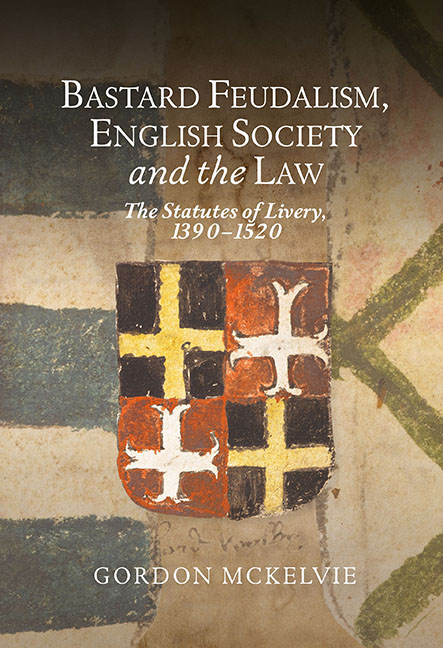Book contents
- Frontmatter
- Contents
- Acknowledgements
- Abbreviations
- Timeline of Parliamentary Activity
- Introduction
- Chapter 1 The System – Liveries and Retaining
- Chapter 2 The Early Years, 1390 to 1449
- Chapter 3 The Later Years, 1449 to 1520
- Chapter 4 Outcomes and Enforcement
- Chapter 5 The Identity of the Indicted
- Chapter 6 The Geography of the Cases
- Chapter 7 Networks and Localities
- Chapter 8 Livery and Disorder
- Chapter 9 The Urban Experience
- Conclusion
- Appendix 1 Number of Cases by Reign
- Appendix 2 Number of Cases in each County
- Appendix 3 List of Letters to Towns and Lordships
- Appendix 4 List of Local Ordinances
- Appendix 5 Letters from Henry VII to Duchy of Lancaster Officials
- Bibliography
- Index
Chapter 8 - Livery and Disorder
Published online by Cambridge University Press: 02 April 2020
- Frontmatter
- Contents
- Acknowledgements
- Abbreviations
- Timeline of Parliamentary Activity
- Introduction
- Chapter 1 The System – Liveries and Retaining
- Chapter 2 The Early Years, 1390 to 1449
- Chapter 3 The Later Years, 1449 to 1520
- Chapter 4 Outcomes and Enforcement
- Chapter 5 The Identity of the Indicted
- Chapter 6 The Geography of the Cases
- Chapter 7 Networks and Localities
- Chapter 8 Livery and Disorder
- Chapter 9 The Urban Experience
- Conclusion
- Appendix 1 Number of Cases by Reign
- Appendix 2 Number of Cases in each County
- Appendix 3 List of Letters to Towns and Lordships
- Appendix 4 List of Local Ordinances
- Appendix 5 Letters from Henry VII to Duchy of Lancaster Officials
- Bibliography
- Index
Summary
Bastard feudalism could be a force for cohesion in late medieval England and the nobility are no longer viewed as a self-interested, socially disruptive class continually undermining royal power. K.B. McFarlane argued that civil disorder was really the product of inadequate kingship, such as that of Henry VI, and therefore ‘the abuse of lordship and the prevalence of corruption were merely signs that England lacked a ruler’. Consequently, problems of disorder were a symptom of a lack of leadership as opposed to any inherently violent tendencies of the aristocracy and their followers. Nevertheless, retaining remained a means of recruiting men for rebellious and lawless purposes and, particularly during the Wars of the Roses, many leading nobles were able to exercise a disproportionate influence on national politics. As Philippa Maddern pointed out: ‘a lord was expected to be attended by a retinue which could serve him honourably in time of war; the problem was to tell when a retinue was unjustifiably warlike’. The usurpations of Henry IV, Edward IV (twice), Henry VI, Richard III and Henry VII all depended, to varying extents, on either the ability of the usurper and his allies to mobilise their followers, or the inability of the deposed king to mobilise support from the nobility and the gentry. Retaining was a method of recruiting military support that led to many of fifteenth-century England's usurpations, which ultimately gave the English the unenviable reputation in late fifteenth-century Europe as a nation of king killers. England's record for usurpations made Tudor kings sensitive about large gatherings of noble retainers, as most dramatically witnessed in 1521 when Henry VIII had Edward, duke of Buckingham, executed after he suddenly asked for permission to raise an armed bodyguard to visit his Welsh troops. According to Carole Rawcliffe the duke was genuinely afraid for his own security when visiting Wales, but his family's history of rebellions had raised Henry's suspicions.
Although rebellion was clearly a concern for many kings who sought to limit retaining, the key problem that was connected to the widespread distribution of liveries was maintenance. The phrase ‘livery and maintenance’ is commonly used in the historiography of bastard feudalism, notably by William Stubbs who viewed them as ‘two great sources of mischief’.
- Type
- Chapter
- Information
- Bastard Feudalism, English Society and the LawThe Statutes of Livery, 1390–1520, pp. 162 - 180Publisher: Boydell & BrewerPrint publication year: 2020



